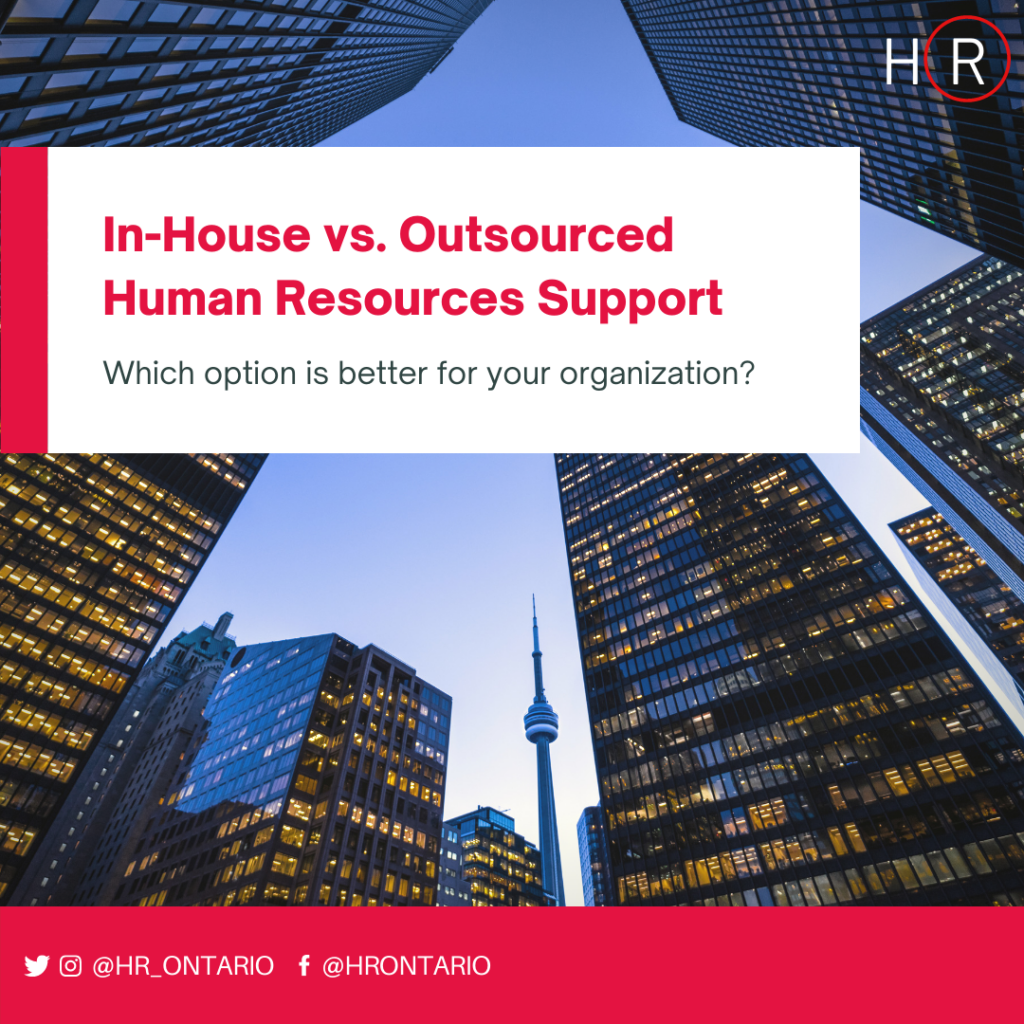
HR functions play an essential role in driving operational performances, employee development, and achieving an organization’s strategic goals. Many business owners now see the importance of human resources and wish to hire HR professionals to join their team. However, there is much contemplation between hiring an in-house HR Manager or outsourcing all human resources support to an external company. The reason is that many employers are unfamiliar with the pros and cons related to each option. So, let us explore this topic together.
The Pros of Having an in-house HR Manager
Having an in-house HR Manager is beneficial because they are more accessible, affordable (because the employer determines the wage or salary), and sustainable. After all, in-house employees are more in-tune with the organization’s company culture, dynamic, and brand, making it easier for them to communicate with other staff. An in-house HR Manager will have more control over their employees. It is easier for them to monitor or manage each member’s development and productivity, and address problems as they arise. Furthermore, in-person conversations between the HR Manager and their employees can occur regularly, allowing the two parties to develop a stronger communication bond. This form of engagement is also helpful in promoting healthy company culture.
Another benefit is that several functions can run a lot smoother. For example, if there are errors with payroll or an employee’s personal information (e.g., address, contact information, etc.), an in-house HR Manager can adjust or correct these mistake(s) more efficiently.
The Cons of Having an in-house HR Manager
Although there are many benefits and advantages of hiring an in-house HR, there are also some drawbacks. In-house HR offers a lower level of privacy because realistically, employees chat and will share their opinions, which is inappropriate, especially if the conversation is related to sensitive information. When HR professionals are too close-knitted with their employees, their ideas may become myopic and biased, which means they will not offer vital insight or new perspectives.
Another disadvantage is that their employment is not budget-efficient. High-quality talent may expect health and dental benefits, and most likely, an RRSP plan that matches their existing one. Attracting and retaining quality talent can be challenging, especially in our current tight labour market. Furthermore, recruiting, screening, and interviewing prospective candidates require time and careful consideration. Unfortunately, when an employee departs from an organization, the entire recruitment process, including screening, selection, and on-boarding, begins all over again. Each process costs money, and it can ultimately increase the organization’s overall overhead costs.
The Pros of Outsourcing HR Functions
On the contrary, however, outsourced HR professionals or freelancers do not have the same expectations as in-house employees. For example, an outsourced HR Manager may not expect health and dental benefits or an RRSP plan match. Employers often pay a flat rate to acquire outsourced services or functions, which helps lower corporate costs.
Furthermore, professionals working at an HR agency or company are well-versed in this area of discipline, which means employers can save a significant amount of time searching for qualified talent to help them with various HR functions. Skillfully trained HR professionals may get tasks and projects completed quicker, which can help enhance the company’s business presence, promote higher levels of productivity, and fulfill more corporate goals.
Moreover, external or outsourced HR professionals tend to balance their inputs without infusing internal politics into their advice and suggestions. Many forward-thinking employers are now outsourcing their HR functions for preventing discrimination among employees. Since it is easier for external HR professionals to compartmentalize their work and feelings, it allows them to maintain a higher confidentiality level and offer insightful feedback or suggestions.
Outsourcing HR services can also help reduce business risks. HR professionals are acquainted and well-informed with the latest updates on various employment laws and regulations. Ensuring compliance with the law is vital in keeping an organization from losing its right to operate. Furthermore, outsourced HR functions allow employers to mitigate the risks of interrupted services without impeding other organizational areas or departments.
The Cons of Outsourcing HR Functions
External HR members are more likely to face segregation within an organization because internal employees are unfamiliar with them. As a result, they are less likely to entrust the HR representative with their personal and professional goals, ambitions, and concerns. This could potentially cause some political issues. However, the relationship between the two parties can become better over time.
Employers and their executive members may develop a dependency or experience a loss of control after outsourcing their HR functions to an external company. Dependency or loss of control can create a greater risk of discrepancy between the organization and its outsourced agency, which can affect the entire working atmosphere. This can ultimately damage the organization’s employer brand. To prevent this from happening, the employer, their executive members, and the outsourced agency must all work collaboratively with one another, ensuring everyone’s expectations are aligned.
As you can see, there are various pros and cons to both in-house and outsourced human resources. However, HR continues to remain as a vital component of every growing business.
Are you still ambivalent about which option is best for your organization? Don’t worry. That’s why we’re here. Contact us today to see how we can help: ✉️ [email protected]
